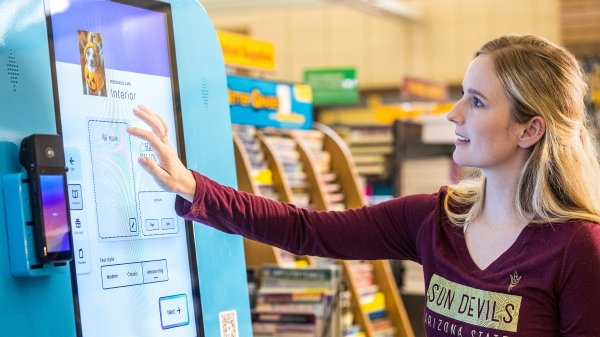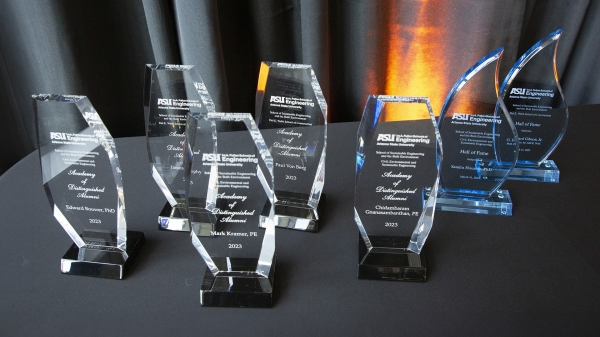Online retailers have an opportunity to persuade hesitant shoppers to click “buy” this holiday season, according to new research by an Arizona State University marketing professor.
It’s all in the labeling.
A study by Christopher Lee, a clinical assistant professor in the W. P. Carey School of Business at ASU, discovered that online shoppers are more likely to purchase an item as a gift if it’s labeled a “best-seller.”
However, people are more likely to buy something for themselves if it’s branded “limited edition,” according to the project, published in the Journal of Retailing at New York University.
“It’s the idea where in any gift-buying scenario, we’re nervous if they’ll like it and whether it’s a good product,” Lee said. “The idea that ‘this is a best-seller’ would help ease that uncomfortable feeling.
“But when we’re buying for ourselves, we’re driven by two things — a need to be unique, but also a need to belong. So when a product is labeled ‘limited edition,’ we’re more persuaded by that for ourselves,” he said.
Lee researches framing — how the subtle use of words can change perceptions.
“If I describe an arena as ‘half full’ or ‘half empty’ and ask people to predict attendance, how close the game is or other information, it turns out that switching those two words influences perception,” he said.
Lee, who got his master’s of business administration degree at ASU, returned to ASU this year after serving as an assistant professor at Temple University, where he started this project with a colleague, Laurie Wu, an assistant professor in the School of Sport, Tourism and Hospitality Management.
The two researchers began by studying Google search trends and found that people more frequently searched for “limited edition” than “best-seller.” That is, until they added the word “gift” to the search query and found the results flipped. People more frequently searched for “best-seller” and “gift,” particularly in December.
Christopher Lee
So to dig deeper, they created four online surveys and polled hundreds of people around the country about how likely they were to buy different products, such as a coffee mug, a bobble-head figurine or wine for themselves or someone else. Then the researcher changed the description to be either “best-seller” or “limited edition,” and they measured the differences.
“The idea held that if I’m buying for someone else, I’d rather have a best-seller than something unique,” he said.
However, Lee and Wu also found that price can negate the effect. Later studies included the price on the bottle of wine.
“If I see a bottle of wine that’s $10, I’m not going to believe that it’s a limited edition because it’s so cheap,” he said. “On the flip side, we tried it with a $25 bottle of wine and saw that the ‘best-seller’ cue doesn’t work as well because I’m not going to believe that a relatively expensive bottle of wine is a best-seller.
“The pricing itself can enhance or detract from this effect working. If you have an expensive item and you’re trying to convince people it’s a best-seller, that’s a tough sell.”
The effect also is modified is you know the gift recipient fairly well. The surveys involved buying items for colleagues, and subjects were asked to indicate how close the relationship was. The less close the relationship, the more risk in the gift giving, so the “best-seller” label helps.
“If you know the recipient of the gift really well, it is similar to buying for yourself, in which case the ‘best-seller for others’ effect goes away,” he said.
The researchers said that online retailers should use the “best-seller” label ethically — on the items that actually are the most popular, as indicated by an automatic sorter — rather than applying it arbitrarily for marketing purposes.
Lee said that some online giants such as Amazon and Gifts.com are proficient in this strategy, tagging their best-selling items, while other retailers stick with simple branding like “gifts for him.”
“They’re missing an opportunity to persuade people,” he said.
See the study here.
More Business and entrepreneurship

Thunderbird at ASU, W. P. Carey School team up on concurrent master's degrees
Students are now able to take advantage of two world-class schools at Arizona State University, at the same time. The Thunderbird School of Global Management and W. P. Carey School of Business…

ASU alum's personalized greeting card kiosk debuts on Tempe campus
Everyone knows how disheartening it is to dash into a store to grab a last-minute holiday card and find the selection picked over and in disarray.An Arizona State University alumna has created a…

Celebrating industry giants and distinguished alumni
Four outstanding alumni and two industry leaders will be honored at the School of Sustainable Engineering and the Built Environment’s Hall of Fame and Academy of Distinguished Alumni event, scheduled…

